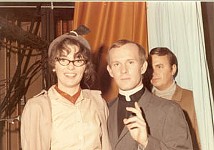The Smothers Brothers
Tom describes the brothers' bloom
By Robert Faires, Fri., Oct. 23, 2009

Their act wasn't supposed to last 50 years. According to Tom Smothers, he and his younger brother, Dick, started by taking satirical pokes at folk singers, which shouldn't have had a shelf life any longer than the folk craze itself. But they hit just as stand-up was entering a new golden age, thanks to comedy LPs and TV talk and variety shows, and once the bros developed their unique blend of music and sibling squabbling, they were off. A gig at San Francisco's Purple Onion lasted months, which led to a shot on Jack Paar's TV show, then a string of comedy albums, then a sitcom, then, most famously, a variety series. The Smothers Brothers Comedy Hour's evolution into a counterculture showcase, with rock acts and pointed political satire, so unnerved CBS that it pulled the plug after the third season, disrupting the brothers' career for several years. But they eventually returned to touring and are still at it 50 years on, performing some 100 shows a year, the last great comedy team. Prior to their appearance at Dell Hall with the Austin Symphony Orchestra, Tom Smothers spoke to the Chronicle about comedy, his heroes, and, oh yes, politics.
Austin Chronicle: Do you ever find yourself thinking about those first days?
Tom Smothers: Oh, a lot. Not a lot, but at this point for Dickie and I, our future lies in our past.
AC: Well, it's kind of being thrown in your face these days, what with being asked to look over all the old shows for the DVD sets and being interviewed for the documentary Smothered about the Comedy Hour and David Bianculli's new book [Dangerously Funny: The Uncensored Story of The Smothers Brothers Comedy Hour].
TS: It's amazing. Forty years after The Smothers Brothers Comedy Hour, I had no idea it had such a staying power, that it impacted so many people. That's a long time to still talk about something. I have a young son, he's 16 years old: "Dad, that's the olden days." We had to edit with a razor blade. And there was only one camera. You couldn't do all the stuff [they do now]. But there it was. It was a landmark thing, and at the time, of course, when you're at the scene of the accident, the scene of what's going on, you don't really .... There were a whole lot of tumultuous changes in America while we had our show on. It attaches to Martin Luther King. We were on the air when he was assassinated and Bobby Kennedy and the war in Vietnam and the Chicago riots. I guess that's why that show stuck in people's minds. It was only 72 shows, which was three seasons. But it sure held up, didn't it?
AC: So you're coming into LBJ territory. Are you concerned that his ghost may be haunting your hotel room?
TS: [Laughs] Well, you know, we got along pretty good after he retired. I sent him a letter when he said he wasn't gonna run and talked about democratic concepts, and he sent me back a letter, it was so good, so cool, saying that to be the leader of a great country, you have to be the target of satirists. And he said, "May no leader be so pompous and everything that they lose their sense of humor and perspective." That was pretty nice.
And he did get the message. He knew we should be out of Vietnam. Now, here are the same assholes running the same thing. Different people [but] .... "We've got to win the hearts and minds of the people of Afghanistan." Yeah. C'mon. You can't beat people up and have them say, "I love you." We never learn those lessons, I guess.
My heroes are everybody that kinda steps out of line and questions [authority], and they always take a terrible beating from mainstream people, and they always turn out to be right. I adore ... the guy who runs for president all the time ....
AC: Nader? 'Cause the first name I went to was Pat Paulsen. But I didn't think that was who you were talking about.
TS: [Laughs] Not as a real hero, though he's a comic hero of mine, but Ralph Nader's never stopped being involved. Pete Seeger never quit. And Bill Maher and George Carlin – these people, I feel so inferior and guilty for not keeping up the power of belief that those guys had. When their platforms were taken away, they didn't quit. They just kept knocking and pounding on the door all the time. And they cared about people. We don't have that anymore. It's all, "Let's see, what's it gonna cost?"
AC: So where does a 50-year-old comedy act fit into this kind of world?
TS: Someone said, "What do you guys do?" And I said: "We're still entertaining. People leave our show feeling good, and they know exactly where we stand, and they know we're validating people and their rights, et cetera." But, I said, "We kinda try to go out of our way to loosen the screws of despair a little bit and let some laughter in."
The Smothers Brothers will appear with the Austin Symphony Orchestra Friday, Oct. 23, 8pm, in Dell Hall at the Long Center for the Performing Arts, 701 W. Riverside. For more information, call 476-6064 or visit www.austinsymphony.org.









